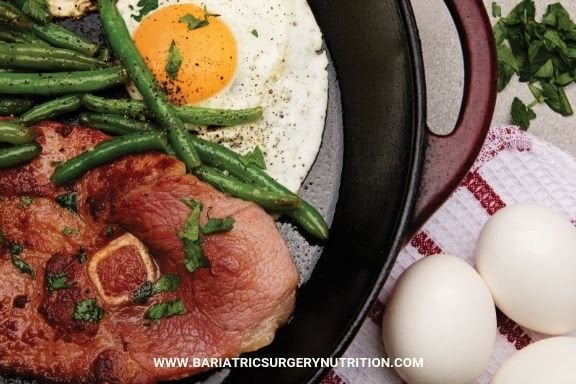Keto and Bariatric Surgery

First off, what is a ketogenic diet?
The ketogenic diet is a very low carbohydrate, very high fat, low-moderate protein diet. Historically, it has been used to control epilepsy in children.
When you don’t give your body carbohydrates (your body’s preferred fuel source), it begins to use and break down body fat as a source of energy, which is called ketosis. The breakdown of fat leads to the production of ketones, and the ketones are what begin to fuel your body (instead of the carbohydrates you were feeding it before). This process can take a few days to achieve, and when done correctly, can be tested by measuring the ketones in your urine with a dipstick. If ketones are present, this means you’re in ketosis.
What does the macronutrient profile look like?
FAT – A ketogenic diet should include healthy fats such as fats from fish, seafood, eggs, nuts, vegetable oils, dairy, and some meats. There is a lot of poor information on the internet that encourages people to have the majority of their fats in the form of cream, lard, bacon, and fried foods, which are not good for our heart.
CARBOHYDRATES – The ketogenic diet is described differently depending on the source, but on average it means limiting your carbohydrates to 5-10% of total daily calories. For bariatric patients eating around 1200, 1500, or 1800 calories/day, this works out to 22, 28, or 34 g of carbohydrates/day, respectively. That’s very little!
Foods rich in carbohydrates that are limited/eliminated in a ketogenic diet include: grain products (e.g. pasta, rice, bread, etc.), fruit, many vegetables (e.g. potatoes, corn, carrots, squash, etc.), some dairy products (e.g. milk, yogurt), legumes (e.g. chickpeas, beans, lentils), and sweets and sweetened beverages (e.g. chocolate, ice cream, pastries, juice, soda, etc.). That’s a lot of food groups being restricted!
PROTEIN – On a ketogenic diet, protein is considered low-moderate (depending on your protein requirement), or around 15-20% of total calories. For bariatric patients eating around 1200, 1500, or 1800 calories/day, this works out to 52, 65, or 78 g of protein/day, respectively. Are these protein targets in the range that your dietitian has recommended for you? For many of you, likely not.
FIBRE – Fibre falls under the umbrella of carbohydrates. Because you now know that carbohydrates are very limited on a ketogenic diet, you can guess that fibre will also be very limited. A diet very low in grain products, fruits, most vegetables, and legumes means that constipation is going to be a real issue!
I heard that a ketogenic diet leads to rapid weight loss.
It’s true in the beginning, but the important factor here is to understand what kind of weight loss this is. Yes, it’s true that reducing carbohydrates leads to weight loss, however the weight that’s initially lost is mainly water weight, not fat.
Here’s a behind the scenes look at what’s going on: Your body always wants to keep your blood sugar well controlled, so it stores some sugar (or glycogen) in your liver. When you’re sleeping, or fasting, your body uses this stored glycogen to send some sugar into your blood, to be sure that your blood sugar doesn’t drop too low. Glycogen is stored in your body by attaching glucose to water. So when we empty our glycogen stores, we’re actually losing a fair bit of water as well, and that’s the initial weight loss that you see. The weight loss that follows from there is partly muscle loss if you’re not meeting your protein needs (which as discussed above, might be the case) and fat.
While ketogenic diets have been shown to be better for weight loss than other low fat diets, the results are only true in the short term. In the long-term, there doesn’t appear to be any difference. You’re also more prone to rebound weight regain on a ketogenic diet once you re-introduce carbohydrates again (whether by choice, by cravings, or by obligation because you feel unwell without them).
But I thought that the ketogenic diet was proven to be effective?
The ketogenic diet isn’t a new diet at all. It’s actually been used for almost 100 years to treat children with severe epilepsy who don’t respond to medication. However, even these children don’t stay on the ketogenic diet their whole lives, they only do so for a temporary amount of time. These children are followed very closely by their doctor and dietitian to very slowly bring carbohydrates back into their diet.
Despite what you dietitians say, I want to try the ketogenic diet!
Ultimately, it’s entirely your decision to try what you want. We (as dietitians) are only here to guide you through the evidence that’s out there, and as of now, there’s no research on the ketogenic diet after bariatric surgery. There’s also not enough long-term research to know and understand if the ketogenic diet is safe for your heart in the long-term (i.e. more than 12 months of being on the diet).
Three of our biggest concerns as dietitians are:
1) Are you meeting your protein needs?
2) Are you emphasizing healthy fats;
3) Are you just looking for a quick fix?
If you’re using the ketogenic diet as a “reset” just like the last fad diet you tried, you’re only feeding the yo-yo dieting pattern (just playing devil’s advocate here!).
Can I be on a ketogenic diet my whole life?
The honest answer is we don’t know. We don’t have research on the long-term effects of following a ketogenic diet. It’s suspected that it may lead to higher cholesterol levels which may lead to heart disease, but more research is needed to conclude this.
Does being on a ketogenic diet guarantee that I’ll keep the weight off?
While more research is needed, one study showed that the participants who were very strict about following the ketogenic diet were able to keep off the initial weight loss for up to 56 weeks (or a little more than one year). We don’t have the research to say if in 10 or 20 years that their weight will still be stable or not. We do know however, that if you don’t find the ketogenic diet realistic for your lifestyle and you end up coming off of it, you will regain the weight (if not more), as with any temporary diet.
Is the ketogenic diet safe?
While it may be generally safe (meaning you’re not going to die) for most people, you should always check with your doctor, especially if you have heart disease, liver disease, and diabetes, as this diet may put your health at risk.
The ketogenic diet is not considered safe for those who have chronic kidney disease.
The ketogenic diet has received a lot of criticism because it’s a very restrictive diet, eliminating many foods and therefore many nutrients that are important for health. Following this diet puts you at high risk for micronutrient deficiencies. Make sure you discuss additional vitamin supplementation with your family doctor or dietitian.
What are the benefits of a ketogenic diet?
Aside from weight loss, following a ketogenic diet has been shown to improve blood sugar control in those with type 2 diabetes, lower triglycerides, lower LDL cholesterol (the ‘bad’ cholesterol), and raise HDL cholesterol (the ‘good’ cholesterol). Although these benefits sound attractive, know that other low fat diets have produced similar results, and would be safer in the long-term since they’ve been better studied and are less restrictive overall.
What are the risks of following a ketogenic diet?
- Liver disease? – More research is needed, but several rat studies have shown an increased risk of developing liver disease. While results from rat studies don’t 100% translate into humans, animal studies often give an indication or at least a starting point for how something will affect the human body. More research is needed in human subjects.
- Muscle loss. – Another risk of following a ketogenic diet is muscle loss, because most patients aren’t able to meet their protein goals. Losing muscle may put you at risk of weight gain. Working with a dietitian while following a ketogenic diet can help you be sure you’re meeting your protein needs.
- Earlier death? – Like we’ve mentioned, there isn’t enough research yet on the long-term risks of following a ketogenic diet, but a recent study found that low carbohydrate diets (less than 40% of calories from carbohydrates) was linked to earlier death, compared to having a moderate-carbohydrate diet (50-55% of calories from carbohydrates). Remember that a ketogenic diet has around 5-10% of calories coming from carbohydrates.
How did they explain this increased risk? The risk with a low carbohydrate diet seems to be because the carbohydrate calories are often replaced with more animal protein and unhealthy fats, rather than plant-based protein and healthy fats. Note that this study was not on bariatric patients, but again, the findings are interesting.
What are the side effects of a ketogenic diet?
Side effects during the adaptation period (i.e. in the beginning of following a ketogenic diet) include:
- brain fog,
- fatigue,
- headaches,
- nausea,
- strong smelling sweat and urine,
- constipation or diarrhea, and
- poorer exercise performance.
Long-term side effects include:
- bad breath,
- micronutrient deficiencies, and
- muscle loss.
What are common misconceptions of the ketogenic diet?
Many people believe that it’s a carbohydrate-free diet, meaning no carbohydrates at all. This isn’t the case. You can have in the range of 20-50 g of carbohydrates per day (depending on how many calories you’re eating). If you don’t know what this looks like in terms of food, speak with your dietitian.
Another misconception is that a ketogenic diet is high in protein. This also isn’t the case. A ketogenic diet is moderate in protein for the average person (who hasn’t had bariatric surgery), and is therefore typically low in protein for a bariatric patient. As you likely know, low protein puts you at risk of losing muscle which will affect your overall weight loss, and put you at higher risk of weight regain in the future.
Other than muscle loss, what are other negative nutrition consequences of following a ketogenic diet after bariatric surgery?
- Low in fibre – The smaller food intake that you have after surgery already makes getting in enough fibre difficult. This partly explains why so many people are constipated after surgery. A ketogenic diet significantly limits most fibre-containing foods including fruit, most vegetables, grain products, and legumes, so your fibre intake decreases even more. Constipation is therefore even more of an issue!
- High in unhealthy fats – Many people don’t follow a ketogenic diet correctly and include too much saturated fats (or unhealthy fats) in their diet. For example, they may choose bacon, sausages, and lard, over fish, nuts, and vegetable oils. A diet high in saturated fats has been linked to heart disease.
- Low in many micronutrients – A ketogenic diet is also low in important vitamins and minerals such as thiamine, folate, vitamin A, calcium, magnesium, iron, and potassium. While you’re prescribed vitamins and minerals supplements after bariatric surgery, these standard prescriptions don’t account for you following a ketogenic diet. If you do decide to follow a ketogenic diet, it’s important to have your doctor or dietitian re-assess your vitamin and mineral supplements and for you to continue doing blood work regularly.
Will I be able to exercise just as much while on a ketogenic diet?
The downside to following a ketogenic diet is that it may actually reduce your exercise performance (across anaerobic, aerobic, and strength related exercises) in the short-term. If you’re doing low intensity exercises such as walking or a leisure bike ride however, you shouldn’t notice a difference. More research is needed to understand how a ketogenic diet affects exercise performance, especially in the long-term.
I’ve been having episodes of low blood sugar after bariatric surgery. Can I follow the ketogenic diet?
If you’ve been experiencing low blood sugar after surgery, it’s not recommended to start a ketogenic diet. It’s important to understand why you are experiencing low blood sugar as soon as possible.
Here are some of the most common reasons for low blood sugar after bariatric surgery:
- Dumping syndrome due to high sugar intake
- Going long periods of time without eating
- Not eating enough carbohydrates or not spacing your carbohydrates out during the day
- Excess exercise
- An overactive pancreas
- Diabetic medication that is not adjusted properly
Speak with your dietitian to figure out why your blood sugar keeps dropping.
I plan to try the ketogenic diet for a few weeks and then come off of it.
If that’s the case, then don’t bother. The reason this diet works for weight loss is because you are in ketosis (which in itself takes a couple of days to achieve because you need to use up your glycogen stores). If you come out of ketosis, you will no longer see the effects, and thus begins the yo-yo dieting effect.
Always remember – Temporary changes yield temporary results!
I’m already on the ketogenic diet, how can I come off of it safely?
If you’ve already started the diet, reintroducing carbohydrates can lead to bloating, unstable blood sugars, and weight regain. To minimize these effects, begin by including whole grain products, rather than refined processed carbohydrates (e.g. white bread, breakfast cereals, pretzels, etc.). Whole grain foods include quinoa, brown or wild rice, oatmeal, bulgur, and barley. Sweet potatoes would also be appropriate. Include 1 to 2 tablespoons at only one meal per day for up to one week. If you’re feeling okay, begin including one fruit at one snack for a few days, and then try reintroducing yogurt and milk.
But aren’t there doctors and health gurus out there promoting the ketogenic diet?
Yes, there are, but there also were doctors and health gurus promoting the Atkins diet, the Pritikin diet, and the Dukan diet back in the day. There will always be people out there trying to capitalize on the newest fad diet to sell you on the weight loss dream and to take your money. It’s easy to point fingers and put the blame on specific foods or food groups, but ultimately the only way of eating that has been proven effective time and time again, is moderation. As dietitians, we know very well that ‘moderation’ (which means something different for each of our clients) isn’t sexy, but it’s key to having a healthy long-term relationship with food.
I’m pregnant and I want to follow a ketogenic diet.
Following a ketogenic diet during pregnancy is not recommended. While your body can handle being in ketosis, the production of ketones is harmful to your baby’s development, particularly their brain development.
SUMMARY…
– A ketogenic diet is very low carbohydrate, very high fat, low-moderate protein diet.
– A ketogenic diet should emphasize healthy fats, but many sources online emphasize online unhealthy fats (e.g. bacon, sausage, lard, cream, etc.).
– A ketogenic diet is very low in carbohydrates. This means that it’s not only grain products that are limited (e.g. pasta, rice, bread, etc.), but also fruit, many vegetables, some dairy products, legumes, and sweets.
– By default, a ketogenic diet is also low in fibre which results in constipation in many patients.
– A ketogenic diet is considered low-moderate in protein. Most bariatric patients aren’t able to meet their protein needs on ketogenic diet which results in muscle loss.
– We don’t know the effects of a very high fat diet on health long-term, but it likely isn’t good for heart health.
– Many of the benefits of a ketogenic diet (e.g. weight loss, improved blood sugars, lower triglycerides, lower LDL cholesterol, increased HDL cholesterol, etc.), are similarly seen in low-fat diets (while being way less restrictive overall).
– There are many unpleasant side effects to following a ketogenic diet including constipation, poorer exercise performance (at least short-term, no research on long-term performance), muscle loss, bad breath, and micronutrient deficiencies.
– You likely need to take additional vitamin and mineral supplements while following a ketogenic diet. Regular blood tests are still very important.
– A ketogenic diet is not recommended in a variety of health conditions, and is even considered dangerous for some (e.g. patients with chronic kidney disease and pregnant women). Always check with your family doctor and dietitian before making drastic changes to your diet.
– The ketogenic diet has not been studied in people who have had bariatric surgery, so the short-term and long-term effects are unknown.
– The ketogenic diet is very restrictive and is therefore not sustainable for the majority of people. Eating out and socializing around food become almost impossible.
Our final thoughts…
Many patients are quick to blame carbohydrates for weight regain. Instead of jumping to a ketogenic diet, we recommend reviewing the bariatric basics and booking an appointment with your bariatric dietitian.
If you absolutely insist on trying a ketogenic diet, we suggest a “modified keto diet” that consists of more plant-based protein and healthy fats, with enough protein to be sure you’re maintaining your muscle mass.
What are your thoughts on the ketogenic diet? Have you been tempted? Are you currently following a ketogenic diet?
– Lisa & Monica, your bariatric dietitians
P.S. For more tips on healthy living after bariatric surgery, follow us on Facebook (@bariatricsurgerynutrition) or check out our highly praised book HERE!













testtest 0
Posted
Hi
Share this comment
Link to comment